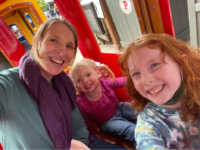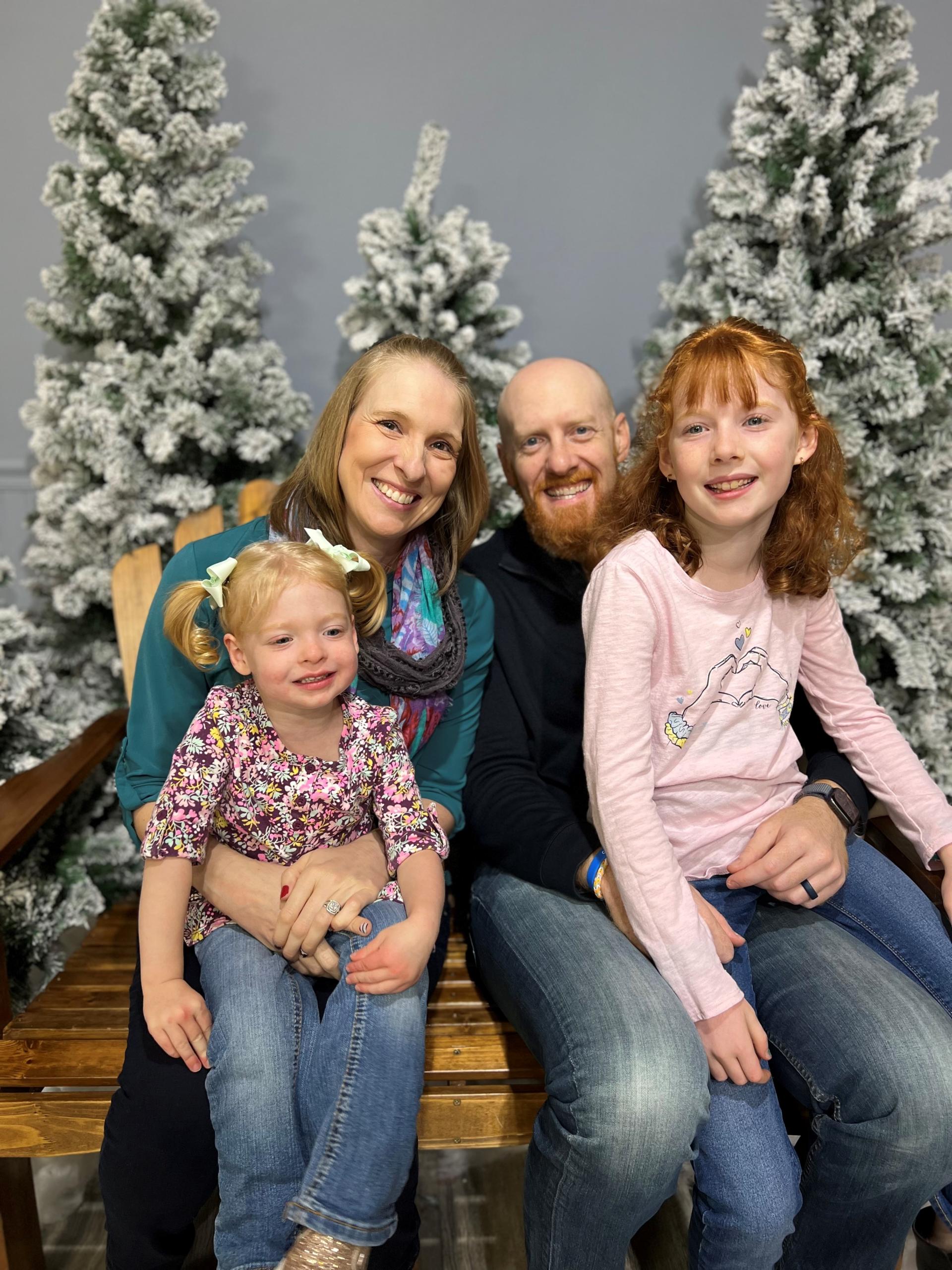Heart to Heart: T1D Caregiver Spotlight – Sarah Pape

 August’s “Heart to Heart: T1D Caregiver Spotlight” is on Sarah Pape! Sarah is a Shareholder and Attorney at Zimmerman, Kiser, Sutcliffe, P.A. in Orlando, Florida. Her daughter, Ellie, was diagnosed with type one diabetes (T1D) on November 14th, 2019 (coincidentally on World Diabetes Awareness Day!). Ellie is now 10 years old and is in the 5th grade; she’s a proud safety patrol, is in the gifted program, and an accelerated math class at school. She absolutely loves being a big sister to her 3-year-old sister, Piper, and spending time with her cousins. She also enjoys swimming and playing tennis, loves all the Star Wars and Avengers movies, and has recently started Ninja training. (Side note: If you haven’t seen the amazing Katie Bone, a 16-year-old T1D competitor on American Ninja Warrior who proudly wears her Omnipod and Dexcom, you must check it out!).
August’s “Heart to Heart: T1D Caregiver Spotlight” is on Sarah Pape! Sarah is a Shareholder and Attorney at Zimmerman, Kiser, Sutcliffe, P.A. in Orlando, Florida. Her daughter, Ellie, was diagnosed with type one diabetes (T1D) on November 14th, 2019 (coincidentally on World Diabetes Awareness Day!). Ellie is now 10 years old and is in the 5th grade; she’s a proud safety patrol, is in the gifted program, and an accelerated math class at school. She absolutely loves being a big sister to her 3-year-old sister, Piper, and spending time with her cousins. She also enjoys swimming and playing tennis, loves all the Star Wars and Avengers movies, and has recently started Ninja training. (Side note: If you haven’t seen the amazing Katie Bone, a 16-year-old T1D competitor on American Ninja Warrior who proudly wears her Omnipod and Dexcom, you must check it out!).
With no history of T1D in their family, it was not even a blip on the Papes’ radar. Ellie had been acting different for several months: sleep walking and urinating at night, drinking excessively, experiencing nausea, and just generally being mopey and uninterested in most things. They chalked it up to the fact that Ellie was getting older and adjusting to life with a baby in the house. Ellie’s little sister, Piper, was just four months old when Ellie was diagnosed – they had just recently arrived home after spending 36 days in the NICU with Piper, and Ellie’s beloved dog had died a few months before. Suffice to say, it was a rough time in Ellie’s life.
The morning of Ellie’s diagnosis, she felt so sick that they let her stay home from school. Sarah was helping her get dressed and she noticed for the first time that Ellie had lost a ton of weight – she was so skinny! Piper had her 4-month checkup at the doctor that morning, so they took Ellie along with them to get her checked out. “We were lucky to have a pediatrician who recognized the signs of T1D,” says Sarah. “They diagnosed her and put her on an IV at the pediatrician’s office, then sent us to the pediatric endocrinologist, who then tested for ketones and sent us to the ER. We spent 2 nights in the PICU.”
“It was rough for sure, but my husband and I smile when we think of the day of her discharge because she was such a different child than when she entered the hospital. We call the anniversary of Ellie’s T1D diagnosis the anniversary of the day we got our daughter back, because after her blood glucose (BG) was stabilized, we had our happy and spunky 7-year-old back.”
As a mom caring for their child with T1D for almost 3 years now, Sarah has learned a lot about managing Ellie’s diabetes. Below you will find more information about Sarah and Ellie, as well as some helpful, realistic advice about being a T1D caregiver:
Throughout your child’s T1D journey, what have been the biggest challenges you faced?
As a parent, Sarah says that the biggest challenge was right after Ellie’s diagnosis when it came to educating all the adults around her about the disease. Ellie’s elementary school, Bear Lake Elementary School in Seminole County, was AMAZING: the School Board nurse helped the Pape family navigate everything, and her teachers and school administrators were very supportive.
“On the other hand, Ellie’s after school program, which was at a different private school, was a challenge. They had never had a T1D child at their school before and were afraid,” explains Sarah. “They didn’t want her back unless we did a training for their staff, and they wanted it to be held by a licensed medical professional. At the time, my husband and I were trying to manage our jobs, the upcoming holidays, and learning about a new disease. We thought about just pulling Ellie out of the school and finding a different option, but everything else in her life was upside down and we didn’t want her to have to leave her friends or feel like T1D had changed one more thing in her life.”
After LOTS of dead ends and LOTS of tears, Sarah was connected with a local organization where they lived in Central Florida that was able to do the training. Now, she looks back and is a little frustrated they had to go through all that considering Ellie doesn’t even go to that school anymore, but she tells herself that it was worth it to spread the word about T1D to more people. “Now, maybe the next T1D family that comes along won’t have to go through what we did,” says Sarah.
The biggest challenge for Ellie has been feeling like she’s different. She can do everything else that every other kid her age can do, but it frequently requires extra thought and planning, which 9-year-olds do not like. Over time, it has gotten a lot better, but the first few months after her diagnosis, Ellie missed out on a lot of things. They shed a lot of tears together.
While adjusting to life with a child with type 1 diabetes, are there certain things you found that helped you better manage their disease? What about something that helped give you hope when you were just getting started?
“So, this is such a little thing in the big picture, but my kitchen scale is my favorite T1D gadget!,” exclaims Sarah. “It’s the kind that has codes for different food and you can weigh things out to calculate carbs. It was a GAME CHANGER.” Managing carb intake as precisely as possible and being hyper-organized has helped the Pape family reduce the stress associated with T1D management. They don’t try to eliminate carbs all together, but they do try to be mindful of carbs and have eliminated some foods that cause BG spikes. “All of the technology available to us, like the Dexcom and closed loop systems, have been a real benefit as well.”
“The things that give us hope are seeing other older kids with T1D out in the world doing amazing things, like Katie Bone (the American Ninja Warrior competitor mentioned above!). We have a babysitter who is a UCF student that has T1D as well, and that is great for us too. Talking to other parents and knowing that there is a community of support gives me hope and a sense of community.”
What skills/lessons has raising a T1D child taught you? For a parent of a newly diagnosed T1D, how would you compare those feelings to now?
 Being the parent of a T1D child has taught Sarah to be fierce, unwavering, and unapologetic in the advocacy for her child; it has also taught her to be sensitive and tolerant to other unique needs of other children, and always look for ways to be inclusive. “For instance, Ellie is having her first sleepover party for her birthday this month. I made sure to contact all the parents of the girls spending the night to ask them about dietary restrictions and needs. I don’t think that would have even crossed my mind before Ellie’s T1D diagnosis.”
Being the parent of a T1D child has taught Sarah to be fierce, unwavering, and unapologetic in the advocacy for her child; it has also taught her to be sensitive and tolerant to other unique needs of other children, and always look for ways to be inclusive. “For instance, Ellie is having her first sleepover party for her birthday this month. I made sure to contact all the parents of the girls spending the night to ask them about dietary restrictions and needs. I don’t think that would have even crossed my mind before Ellie’s T1D diagnosis.”
Can you touch on why it’s important for T1D mothers and caregivers to come together?
“This one hits me personally for sure,” says Sarah. “Our neighbors’ 5-year-old daughter was recently diagnosed with T1D. My husband and I have been helping them navigate their brave new world. Obviously, it’s a huge benefit for them to have parents nearby who have been in their shoes, but it has been a really positive thing for us too.” Sarah and her husband have always been friendly with them, but now feel this unbelievable connection and know that they are going to be friends for the rest of their lives. She told the mom the other day, “you and I are now connected in such a deep way that no other mom will ever know (except, of course, other moms of children with T1D).”
What has JDRF meant to/done for your family? (involvement, connection to community, participation in events, etc.)
“JDRF has brought me personally a sense of purpose and belonging. I didn’t jump into the JDRF community immediately after Ellie’s T1D diagnosis, but about a year and a half later after the dust settled, I wanted to find a way I could connect and give back,” says Sarah. “Every time I go to a JDRF event, I leave feeling happy that I have connected with other T1D families. We are blessed with a very supportive family and group of friends, but it really is next to impossible to truly understand what it is like unless you live it every day like we do.”
JDRF has many support groups for those living with T1D and their caregivers – for more information, visit jdrf.org/t1d-resources/personal-support/. If you’re looking for local support in the Northern Florida area, send an email to northernflorida@jdrf.org and we will make sure you get connected with other families, support groups, and events we host throughout the year.
What is the most important thing you would want other parents of children with T1D to know?
Sarah wants the parents of newly diagnosed children to know that it’s okay to cry and scream and want to punch things (or even actually do so!); it’s okay to be angry and to hate the fact that your child has to deal with this disease… but also know this: it will get better. “You will be a stronger parent for all of this. As mentioned earlier, you will become FIERCE and unapologetic in your advocacy for your child. Your child will see that and will be better for it too. Lean in to the T1D community around you and don’t be afraid to ask for help.”
A True T1D Champion
 We believe that because of parents and caregivers like Sarah, the children living with T1D in our community are given the support and care they need to succeed in life and in managing their disease. To anyone caring for a child with T1D, please know that you are not alone in the sleepless nights and heavy days. JDRF Northern Florida is here to help you and can connect you with a network of other T1D caregivers to share advice, struggles, and words of encouragement.
We believe that because of parents and caregivers like Sarah, the children living with T1D in our community are given the support and care they need to succeed in life and in managing their disease. To anyone caring for a child with T1D, please know that you are not alone in the sleepless nights and heavy days. JDRF Northern Florida is here to help you and can connect you with a network of other T1D caregivers to share advice, struggles, and words of encouragement.
For more information or to submit someone for our “Heart to Heart: T1D Caregiver Spotlight,” please contact Dori Rivers at Drivers@jdrf.org.